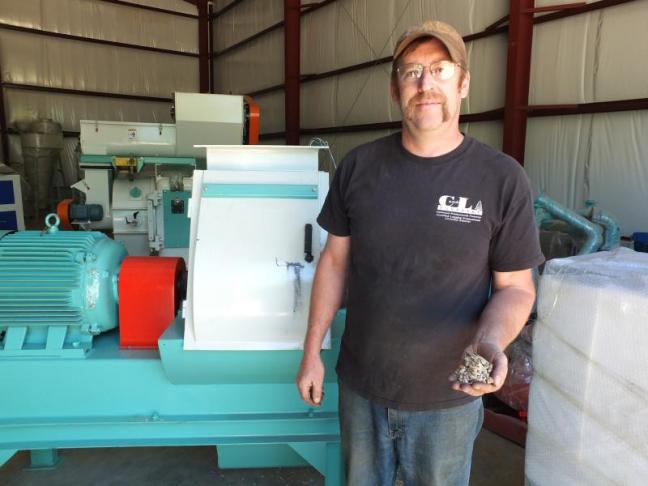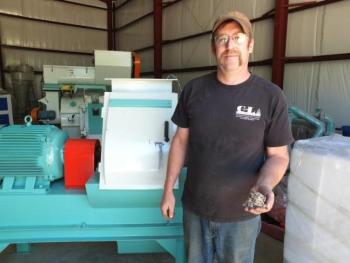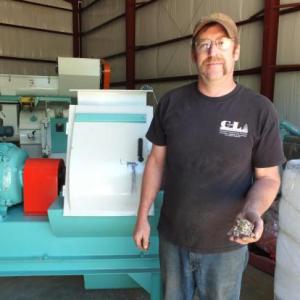Local wood pellet business succumbs to higher electrical costs
In December, Erik Carlson pulled the plug on his fledgling wood pellet business due to high electrical costs. Carlson, a certified forester and logger for two decades, began a journey in 2016 he thought might resurrect the struggling Maine pulp industry.
For decades, Maine’s paper mills were an eager customer for the low-grade quality wood harvested in Maine forests. Many of Carlson’s clients sold pulp to Maine paper mills for years. But increased foreign competition and decreased demand for news print over the past three decades resulted in a major shift in the industry. The continued economic tailspin for newsprint culminated with five Maine paper mills closing between 2014 and 2016.
With pulp being good for little else than making paper, this left Maine woodsmen with forests full of low-grade wood needing harvesting without a market. But one day, in a local hardware store, Carlson stumbled upon a new use for the seemingly endless amounts of spruce, pine and hemlock trees needing thinning in Maine’s forests. Carlson spotted a 40-pound wood pellet bag.
“It came to me as an epiphany. I saw on the bag they were made in Canada. So I figured, this is a great way to keep the local forest product market alive and at the same time create jobs,” he said.
Carlson shifted his focus to the emerging wood pellet industry. He invested in a property in Boothbay’s Industrial Park, traveled to the Far East purchasing small equipment designed for a small wood pellet manufacturing plant, and planned on hiring one to three workers for his operation.
But nearly two years into production, Carlson closed shop after struggling with continuously high electrical costs. The last straw occurred in December 2017 after Central Maine Power sent him a disconnection notice. Carlson received a $7,000 bill. “I couldn’t overcome the oppressive and unsustainable costs of electricity,” he said.
In 2015, he believed his business could compete in the emerging wood pellet business. He listened intently to Gov. Paul LePage’s State of the State Address describing how Maine needed “risk takers and entrepreneurs” for improving the economy. As a new business in the renewable energy business, Carlson thought his business was on the path for success.
“He started talking about energy and the economy, and I thought his whole speech really could’ve been all about me,” Carlson said.
In July 2016, Carlson began production and almost immediately energy costs were much higher than expected. In submitting his business plan for receiving a loan, he consulted with CMP about electrical costs. His estimated electrical costs were about $500, but monthly bills registered at around $2,000 per month. He sought further CMP assistance in understanding his energy costs. He estimated they consumed 25 percent of his operating costs.
“I felt duped,” he said. “I could have managed with a smaller transformer and a generator. But after paying $30,000, for not even a year’s worth of full production, I decided it wasn’t worth it.”
Other larger Maine wood pellet companies continue production. They, too, struggle with Maine’s high electrical costs compared to the national average. Maine Wood Pellets in Athens produces 400 tons of wood pellets per day and had an approximately $300,000 CMP monthly bill. But Maine Wood Pellets as a large scale producer had more resources than a small operation like Carlson’s. Maine Wood Pellets spent several million dollars to build its own co-generation plant for producing its own electricity.
“They were in the same place as me, but they had resources. For me to put in something like that is not feasible,” Carlson said. “Everything came together except for the energy cost which resulted in us working 7-10 days a month just to pay CMP.”
But Carlson had other energy options. He contemplated purchasing a small generator which would have powered his pellet press and hammer mill. These two machines accounted for Carlson paying high demand rates. Carlson didn’t purchase the additional machinery because information provided by CMP didn’t match his actual electrical costs once production started.
According to Carlson, the electrical costs were about five to six times higher than estimated and he couldn’t receive a quote regarding installing a 400-foot power line to his business.
“Had they been more forthright I definitely would’ve done things differently,” Carlson said. “They told me the PUC (Public Utilities Commission) didn’t allow them to give estimates,” he said.
Demand charges were an aspect of energy costs troublesome for Carlson to comprehend. It took him a couple months and one bill charging him a $2,000 demand charge for $56 worth of electricity before he began understanding.
CMP does not discuss customer-specific information with third parties, including the media. Company spokesman Gail Rice said, “Doing so would be a violation of Maine Public Utilities Commission consumer protection rules and our own customer privacy policies.”
But she did offer an explanation of demand charges. Commercial and industrial customers with a demand greater than 20kW are subject to them. The Maine PUC has approved a broad range of pricing schedules for CMP’s commercial and industrial customers, and demand charges are included in those pricing schedules.
“CMP is committed to helping business customers prosper with a broad range of pricing options plus economic development and energy efficiency programs. Demand charges help to pay for necessary infrastructure, and any commercial and industrial customers are subject to them,” she said.
For line extensions, the “cost causer” pays for it, according to CMP. If the extension is an upgrade or new line, the customer pays CMP to have it built. “But we own and maintain it, and pay all taxes on the line,” Rice said. She referred to guidelines established in the Maine PUC’s terms and conditions, Section 7.
In recent years, Mainers have consistently paid less than other New England states, but pay higher than the national average for residential, commercial and industrial electrical rates. In April 2015, a U.S. Energy Information Administration survey showed Maine industrial electrical rates at 9.18 kwH, New England at 12.17 kwH, and U.S. rates at 6.81 per kwH.
In 2015, the administration listed Maine as paying the 11th highest energy costs in the nation. Gov. LePage has worked on the problem of high energy costs since entering office in 2011. Maine Governor’s Energy Office Acting Director Angela Monroe agrees that high demand charges are detrimental to Maine businesses both large and small.
“It’s a little tricky, but a fixable problem,” she said. “The governor has submitted several bills designed to lower costs, but some haven’t gone anywhere in the Legislature.”
Monroe said there are several reasons Maine electricity costs are higher than the national average. One is the region’s natural gas infrastructure is “extremely constrained,” she said. This results in generation facilities paying more for natural gas. “The New England electricity market follows the cost of natural gas, so the lack of adequate capacity drives up costs,” she said.
Another factor is a number of subsidies renewable energy suppliers receive from Maine taxpayers. According to Monroe, these subsidies come in the form of renewable portfolio standard requirements, net-energy billing, community-based renewable projects and long term renewable resource contracts.The loss of several large manufacturing facilities in recent years has also driven energy costs up. The loss of Maine’s paper mills which were a major user of energy has now shifted infrastructure maintenance and construction onto fewer customers.
During the past two years, Carlson has split his time between producing wood pellets and his forestry consultant business. Now that his plant has closed, he will focus on his C&L Forestry business in Edgecomb.
·
·
Event Date
Address
United States





























